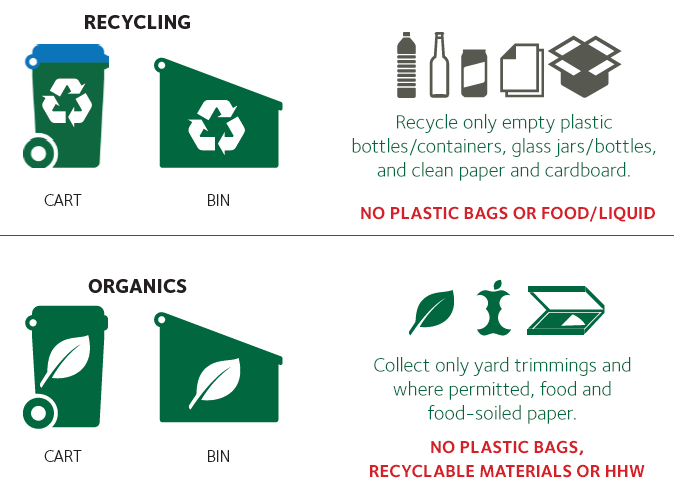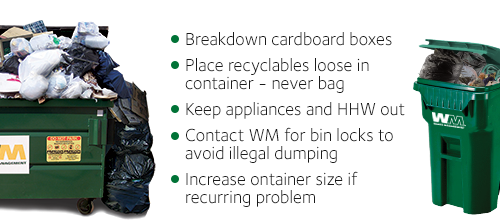2024 Service Calendar and Recycling Guide - Even Week
2024 Service Calendar and Recycling Guide - Odd Week
Recycle Right.
Today’s material processors have strict standards; they won’t accept contaminated loads. Contamination can result in an entire load of recyclables or organics being landfilled. This drives up processing and disposal costs for everyone.
The annual Recycling Guidelines and Services Calendar (top of this page) describes what goes in your recycling and green waste carts along with other important services.
Keep Container Lids Closed.
Open lids are another source of contamination – moisture – which ruins the recyclability of paper and cardboard. Open lids caused by overfilled containers also contaminate our environment with wind-blown litter. Help keep our community clean by keeping container lids closed.
Tips to Avoid Contamination
Follow these simple guidelines to avoid contamination. Click here to download a printable guide.

Contamination Surcharge
To offset the additional processing and disposal costs, the contamination surcharge for recycling and organics is $69 a yard for a bin.
Tips to Avoid Overages

Overage Surcharge
To discourage overfilling of commercial bin containers, the bin overage surcharge is $150.00 per occurrence.
Frequently Asked Questions
What’s wrong with putting trash in Recycling or Green Waste containers?
Any material not listed in the Services Brochure or annual Recycling Guidelines and Services Calendar for the recycling or green waste container is considered trash. In the Recycling Cart, food and liquids ruin paper and cardboard so they can’t be recycled. Materials like plastic bags, clothes, and wires wrap around the sorting equipment used to separate paper, plastic and glass for recycling; causing equipment to break and the bales of recyclables to be contaminated with non-recyclables. Manufacturers reject loads of recyclables with contaminants, which can result in the material being landfilled.
In the Green Waste container, materials like plastic bags, diapers, garden hoses and plant containers get shredded along with the organics meant for compost. These contaminants ruin the compost intended for farming and gardening. The State of California prohibits contaminants in excess of 0.5 percent by weight in finished compost and film plastic is limited to 0.1 percent. These standards are designed to ensure quality compost is used to grow food and nourish our landscape.
To learn more about why it is important to Recycle Right, visit RecycleOftenRecycleRight.com/newsroom.
What’s wrong with overfilling a cart or bin?
An overfilled bin or cart can cause wind-blown litter which results in blight, pollution in storm drains and trash in our water ways. Our cities are held accountable for storm water pollution under the federal Clean Water Act. Falling debris from a container being lifted for service can also fall on the truck’s hot equipment and ignite a fire. Not overfilling containers and keeping the lids shut keep our community clean and safe.
How can you tell if my container is overloaded or contaminated?
Our collection trucks are outfitted with technology that uses GPS mapping and dedicated cameras to validate every bin or cart serviced. The technology frees the driver to have a singular responsibility – collection service excellence. Drivers no longer have to leave their trucks to photograph container overages or contamination. This technology also adds another layer of service quality for customers by automatically recording issues such as a damaged container, missed service or blocked container. The image will trigger reports for container repairs, service audits, customer outreach and more.
What if I dispute the charge?
WM will work with customers to resolve any concerns and disputes. The starting point is access to an image that can be viewed by both parties. An image can trigger an email to customers and in some communities, a written letter is sent. To receive email notification, go to wm.com/myaccount/managemypreferences and provide your email. Every service address has a unique Customer ID to allow you to subscribe to this service. The Customer ID# appears on your bill. If you are not the bill payer, call customer service (located at top of this page) to request your Customer ID# to sign up for email notification. Working together we can create a greener, cleaner community.
To learn more about why it is important to Recycle Right, visit RecycleOftenRecycleRight.com.
